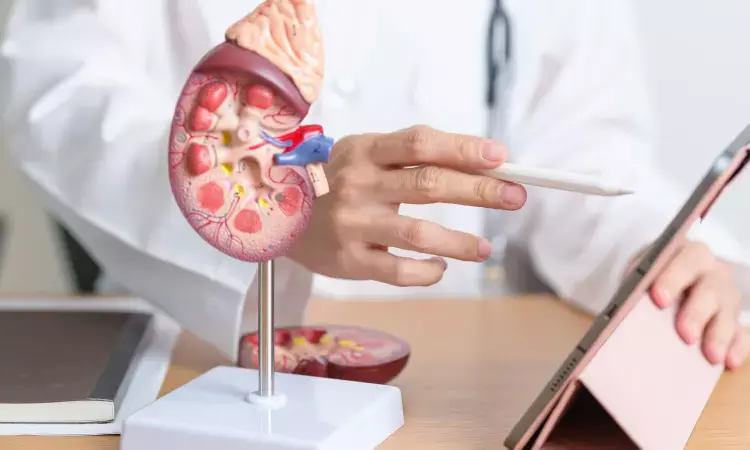- Home
- Medical news & Guidelines
- Anesthesiology
- Cardiology and CTVS
- Critical Care
- Dentistry
- Dermatology
- Diabetes and Endocrinology
- ENT
- Gastroenterology
- Medicine
- Nephrology
- Neurology
- Obstretics-Gynaecology
- Oncology
- Ophthalmology
- Orthopaedics
- Pediatrics-Neonatology
- Psychiatry
- Pulmonology
- Radiology
- Surgery
- Urology
- Laboratory Medicine
- Diet
- Nursing
- Paramedical
- Physiotherapy
- Health news
- Fact Check
- Bone Health Fact Check
- Brain Health Fact Check
- Cancer Related Fact Check
- Child Care Fact Check
- Dental and oral health fact check
- Diabetes and metabolic health fact check
- Diet and Nutrition Fact Check
- Eye and ENT Care Fact Check
- Fitness fact check
- Gut health fact check
- Heart health fact check
- Kidney health fact check
- Medical education fact check
- Men's health fact check
- Respiratory fact check
- Skin and hair care fact check
- Vaccine and Immunization fact check
- Women's health fact check
- AYUSH
- State News
- Andaman and Nicobar Islands
- Andhra Pradesh
- Arunachal Pradesh
- Assam
- Bihar
- Chandigarh
- Chattisgarh
- Dadra and Nagar Haveli
- Daman and Diu
- Delhi
- Goa
- Gujarat
- Haryana
- Himachal Pradesh
- Jammu & Kashmir
- Jharkhand
- Karnataka
- Kerala
- Ladakh
- Lakshadweep
- Madhya Pradesh
- Maharashtra
- Manipur
- Meghalaya
- Mizoram
- Nagaland
- Odisha
- Puducherry
- Punjab
- Rajasthan
- Sikkim
- Tamil Nadu
- Telangana
- Tripura
- Uttar Pradesh
- Uttrakhand
- West Bengal
- Medical Education
- Industry
Low levels of Vitamin D among Kidney stone disease patients linked to higher all-cause mortality

There is growing evidence that high levels of cholecalciferol or 25-hydroxyvitamin D may lead to increased excretion of calcium in the urine and an increased risk of kidney stones.
A recent study published in Frontiers in Endocrinology has concluded that patients with kidney stone disease (KSD)having insufficient serum 25(OH)D concentrations are at a higher risk of all-cause mortality.
This prospective cohort study included 2,916 National Health and Nutrition Examination Survey (NHANES) participants. All causes of death and cause-specific mortality were identified using The National Death Index (NDI). Multivariate Cox regression models calculated Hazard ratios and 95% confidence intervals.
This study aimed to determine the relationship between serum 25(OH)D levels and all-cause mortality in patients with kidney stone disease, as the effects of a deficiency in 25-hydroxyvitamin D on these patients are not well understood.
Key results of this study are:
- During the 18,859 person-years of follow-up, 375 fatalities occurred.
- Eighty-three deaths were from cardiovascular disease (CVD) and 79 from cancer.
- At baseline, individuals with higher blood 25(OH)D concentrations had lower glucose, glycohemoglobin, CRP, and insulin levels and higher HDL cholesterol levels.
- When compared to the group with the lowest 25(OH)D concentrations, those with serum 25(OH)D concentrations ≥75 nmol/L had hazard ratios (HRs) and 95% confidence intervals (CIs) of 0.48 for all-cause mortality.
- The association between serum 25(OH)D concentrations and all-cause mortality in KSD patients was non-linear.
- When serum 25(OH)D concentrations are below 27.7 nmol/L, each unit-nmol/L increase is associated with a 7% decrease in the risk of death from all causes.
They said, "Our study revealed that KSD patients with inadequate serum 25(OH)D levels were more likely to experience all-cause mortality. Hence, it is essential to maintain sufficient blood 25(OH)D levels and prevent 25(OH)D insufficiency in KSD patients to increase their lifespan."
Reference:
Gao, Meng, et al. "Association of Serum 25-hydroxyvitamin D Concentrations With All-cause Mortality Among Individuals With Kidney Stone Disease: the NHANES Database Prospective Cohort Study." Frontiers in Endocrinology, vol. 14, 2023, p. 1207943.
BDS, MDS in Periodontics and Implantology
Dr. Aditi Yadav is a BDS, MDS in Periodontics and Implantology. She has a clinical experience of 5 years as a laser dental surgeon. She also has a Diploma in clinical research and pharmacovigilance and is a Certified data scientist. She is currently working as a content developer in e-health services. Dr. Yadav has a keen interest in Medical Journalism and is actively involved in Medical Research writing.
Dr Kamal Kant Kohli-MBBS, DTCD- a chest specialist with more than 30 years of practice and a flair for writing clinical articles, Dr Kamal Kant Kohli joined Medical Dialogues as a Chief Editor of Medical News. Besides writing articles, as an editor, he proofreads and verifies all the medical content published on Medical Dialogues including those coming from journals, studies,medical conferences,guidelines etc. Email: drkohli@medicaldialogues.in. Contact no. 011-43720751


